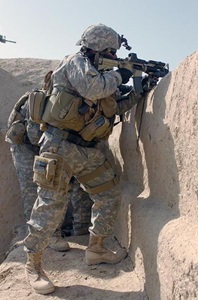In the immediate aftermath of Osama Bin Laden's assassination, religious leaders debated whether the the military action was just and what the right response to such an event should be. For political activists, another question emerged: What does Bin Laden's death mean for U.S. foreign policy? Most agreed that it is "a turning point," but there is less agreement over where exactly the U.S. should turn toward at this point.

For Sojourners president Jim Wallis, the death of Osama Bin Laden should signal the end of the war in Afghanistan, a war he said "no longer has any justification."
"The completion of the largest and most expensive manhunt in history for Osama bin Laden must be a turning point to completely rethink our response to terrorism," Wallis said. "The threats of terrorists are still real, but it is now clear that full-scale military action is not the most effective response."
David P. Gushee of the New Evangelical Partnership for the Common Good echoed Wallis' view. Gushee said there is now the "opportunity … for the United States to reconsider the questionable moves we have made in the name of the war on terror. From our perspective, this includes … the expansion rather than ending of the ten-year-old war in Afghanistan."
Richard Land, president of the Southern Baptist Ethics & Religious Liberty Commission, said Bin Laden's assassination was indeed a "turning point," but one in the war on terrorism that he said included both Afghanistan and Iraq. He compared it to the battle of the Midway in World War II that began to put the Japanese on the defensive.
"We defeated [al-Qaeda] in Iraq. And we're doing the same thing in Afghanistan now. This is not the end of al-Qaeda, not the end of the Taliban," Land said.
Breakpoint's Chuck Colson also saw this as "a major turning point in the war against terrorism." But he said, "the real turning point could be in how we conduct this war hereafter."
Colson reiterated his belief that the troop levels in Afghanistan is no longer a "just war" because the goal is now about nation-building. He said reduced troop levels would save both dollars and lives.
"The success of the operation against bin Laden proves that targeted, behind-the-scenes operations based on solid intelligence give us the best chance to eliminate the terrorists. It's like using a rifle instead of a shotgun," Colson said.
Heidi Unruh of Evangelicals for Social Action said that despite Bin Laden's death, the war in Afghanistan remains complex. The assassination raises the question of whether the U.S. should walk away from the region or increase its efforts.
"Our first question as Christians remains: How do we make use of our national resources—including the precious lives of our soldiers—in a way that more closely reflects the values and aims of the kingdom of God?" Unruh said. "I believe this means, in part, preparing for the 100,000 troops in Afghanistan to come home, without wavering in our commitment and responsibility to help empower the Afghan people to rebuild their economy, civil society, and a more just government."
For more commentary on U.S. action in Afghanistan see The Village Green from the September 2010 issue of Christianity Today:
Stay in Afghanistan? Let Jesus Call the Shots by Will Willimon
Stay in Afghanistan? It's the New Normal by Chris Seiple
Stay in Afghanistan? There's No Other Choice by Jean Bethke Elshtain

Support Our Work
Subscribe to CT for less than $4.25/month


















